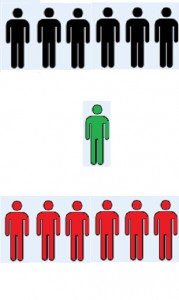The group of people who first agreed to set up the Middle Way Society in 2013 came in contact with each other in the context of ‘Secular Buddhism’. But one of my personal motives in wanting to create a society distinct from Secular Buddhism was considerable dissatisfaction with that label. The best things I found in the Secular Buddhist movement seemed to me neither distinctively Buddhist nor distinctively secular; and the worst were both, somehow managing to combine two types of dogma in unholy alliance. The label was both unhelpfully ambiguous and incoherent, and instead I wanted to put forward a clear and positive account of the best of the values that I found under it, in the form of the Middle Way. Middle Way Philosophy is not Buddhist because, however much it may owe to the Buddhist tradition (which is probably less than instant pigeon-holers assume), it does not accept any authority from it and is far from culturally defined by it (see recent video). But the question of in what ways it is not secularist is an even more vexed one. What does secularism mean? For some people (such as Stephen Batchelor) it seems to mean something similar to the Middle Way, whilst for others it evokes figures like Richard Dawkins and the metaphysical certainties of scientism.
My thinking on this point has been stimulated recently by reading this article about the efforts of the French education minister to overhaul the principle of secularism in French schools. The French principle of laicité, often translated as ‘secularism’, means the separation of church and state, so that the state is neutral and religion a matter for the individual. The French minister is concerned that the principle is being misinterpreted by Muslim students as an anti-religious attack on them and their beliefs, and that this is contributing to Muslim radicalisation amongst French young people. French secularism is innocent of contributing to such reactions, the narrative goes, because it is actually there to protect religious minorities and has just been misunderstood. However, I think there are two kinds of problems with this narrative: one concerns the meaning of ‘secularism’, and the other the idea of state neutrality.
The philosopher Charles Taylor helpfully distinguishes three senses of the term ‘secularity’. Secularity 1 is the separation of church and state, as constitutionally required in both France and the US since the eighteenth century. Secularity 2 “consists in the falling off of religious belief and practice, in people turning away from God, and no longer going to Church” (A Secular Age, p. 2). In this second sense the UK is a much more secular society than the US. Secularity 3 is a social transition “from a society in which it was virtually impossible not to believe in God, to one in which faith, even for the staunchest believer, is one human possibility among others”.
Secularism, then, could probably be similarly divided, as the belief in the value of each of these respective types of secularity. The French minister’s laicité is Secularism 1. The promotion of atheism and anti-religious sentiment, as in the work of Richard Dawkins, is Secularism 2, which probably in most cases also encompasses Secularism 1. Secularism 3, however, seems to simply mean support for an open society where metaphysical beliefs are not imposed by the group – in that third sense, then, I’d be happy to count myself a secularist (along with most people, including most religionists, in Western society). But the dogmas that threaten open societies are by no means limited to religious ones, making ‘secularism’ possibly a misnomer for this third form. The USSR and other Communist regimes, for example, were probably not secularist in this third sense, given that there were no alternative possibilities, even though they were in the first and second.
The problem encountered by the French minister of education is the association of Secularism 1 with Secularism 2. She argues that keeping religious symbols such as the hijab out of French schools or other public places is not anti-Muslim. However, to me it doesn’t seem so surprising that people often have trouble telling the difference between Secularism 1 and Secularism 2. In practice they may look very similar.
The problem here lies in people’s assumptions about boundaries and about the possibility of neutrality. In official and legal terms the state is neutral, but the state is in practice represented by people, and people are not – indeed cannot – be neutral. Nor can the Secularism 1 of the Republic as a whole necessarily dictate the motives of the flesh-and-blood people who enforce the rules, which may well stray a long way into Secularism 2. The civil servant or other public employee is obliged to try to force neutrality onto herself by repressing her individual beliefs, when these are contrary to the role she has undertaken, and these are very likely to manifest themselves in terms of the body language, tone and whole approach of the ‘neutral’ person. Rather than unsuccessfully attempting to be neutral, the state should be much more selective in its fights and firm in maintaining values that will benefit all, and these may also be easier for the state employee to fully support: but the principle of division of church and state may interfere with that needful discrimination.
In the UK, of course, we also have plenty of problems with this type of false neutrality, associated as it is with bureaucratic managerialism, where paperwork replaces trust, and conceptual ideas of desirable goals are often substituted for informative experiences about how far they are actually occurring. But in matters of religion in the UK, the population has largely been able to persist in its steady drift away from the Church without usually needing to pretend neutrality in religious allegiances. There are up-sides to having an established church, when it is so broad and tolerant. So, broadly I think we have an incrementality about religious commitment that, although riddled with inconsistencies and political hypocrisy, has allowed Secularism 3 to emerge without as much conflict as is found either in France or the US.
So, the trouble with secularism in general could be summarised thus. The separation of Church and State (Secularism 1) is difficult to achieve in practice without anti-religious secularism (Secularism 2). Anti-religious secularism creates conflict, not just in society, but also in the individual, who may repress the religious dimension of their experience and fail to integrate the archetypes that are still powerful even in the strongest atheist. That doesn’t mean there shouldn’t be some degree of separation between Church and State, particularly so as to try to avoid discrimination against religious minorities: but the absolute neutrality of the state is a fiction. Secularism in the sense of the open society (Secularism 3) is desirable and achievable, but hardly controversial in the West. To call oneself a secularist in the third sense when it is so strongly associated with the first and second senses doesn’t seem to be useful.
Instead, of course, I think the Middle Way is the answer here. Rather than committing itself to an unattainable neutrality, I think the state should recognise and promote the importance of Secularism 3 as the key to a harmonious and progressive multicultural society. Except that there’s really no need to call it secularism and thus antagonise the religious – it’s a Middle Way approach, and can be associated with agnosticism rather than atheism. A Middle Way approach requires us to recognise where we start, including the metaphysical beliefs that we may start with. At the same time, though, it is both more decisively anti-dogmatic and more even-handed than secularism usually is, in recognising that absolute beliefs are not desirable whether they are positive or negative. With students in school, one needs to recognise their beliefs fully and allow them to be expressed, but at the same time challenge them through a critical and psychological education that undermines both absolute belief and its denial. The riches of a student’s religious tradition at no point need to be denied, but their absolute interpretation of that tradition can be legitimately challenged at every point, and it is the state’s duty as educator to promote such challenges. What is the point of banning the hijab, when in some cases it may be merely a symbol with no practical implications, and yet leaving the underlying absolutist beliefs unchallenged?
The motives behind secularism are often ones that recognise the damaging effects of absolute belief, but secularism can too easily become an absolute belief itself, not only by denying claims that lie beyond human experience, but also by erecting absolute conceptual boundaries between church and state (or between public and private life). It seems to me that many secularists, if they were to look more closely at these issues, might well arrive at a Middle Way position. But it is important to keep the Middle Way separate from secularism so that it remains a basis on which people from any background can find common ground in experience.
Related pages:
Middle Way for Atheists
Religion resources indexed
Review of ‘The Moral Landscape’ by Sam Harris
Picture: Secularism March by Andrew West (CCSA 4.0)



